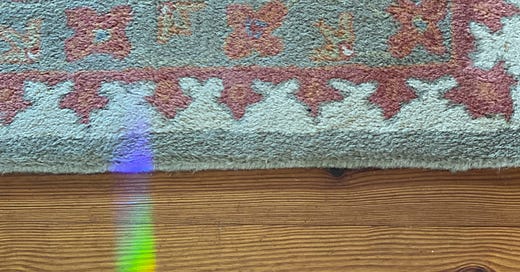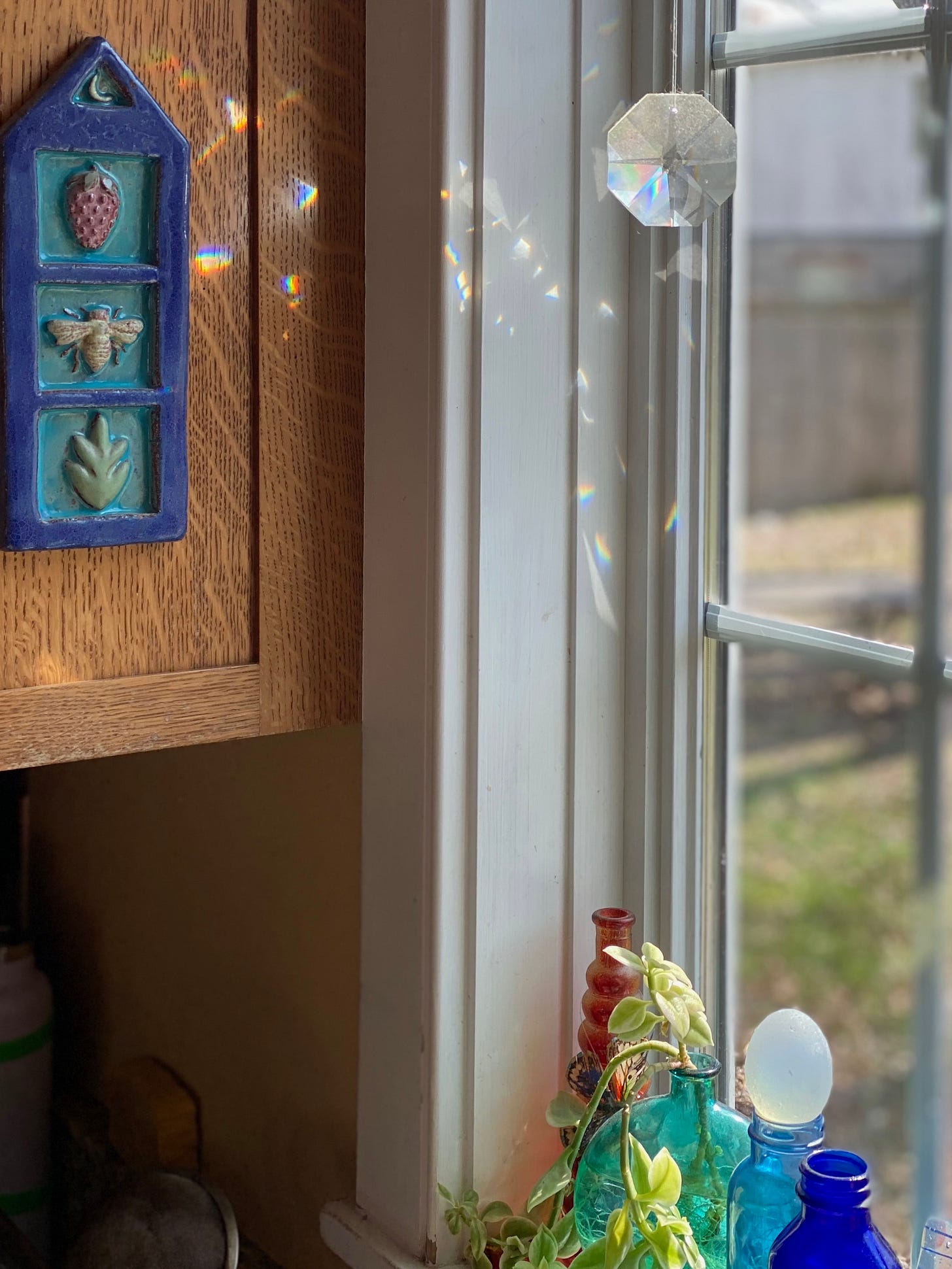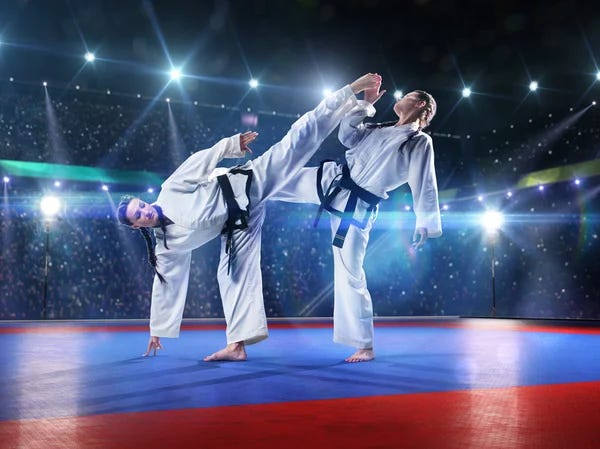Before this week’s essay, a note: If you haven’t seen it yet, check out Bok-bok: A special announcement for an explanation of my new paid subscription options and the thinking behind those. Thanks!
I keep a collection of knickknacks on my kitchen windowsill: antique bottles in varying shades of blue, tiny blown-glass chickens, diminutive artistic tiles, seeds from one of the native persimmons I ate last fall. Hanging above the salmagundi, from a strand of monofilament, is a 2.5” glass crystal. Once or twice a sunny day, depending on the season, its broad bevels scatter rainbows across our living spaces like a unicorn crumb trail.
Forty-five years ago, I won the crystal for selling more candy bars than anyone else in my civics club. I was given a choice of prizes and recall thinking that if I took good care, the glass suncatcher would last much longer than any of the other selections. I don’t remember going to great lengths to best my classmates, but it was definitely nice to win.
Who doesn’t like the feeling of coming in first? Being in the spotlight could be temporarily uncomfortable for some, but beneath the surface, the honor of winning is bound to bring joy. Though never much involved in team sports, over the years I have found other activities at which I could excel, and I brought home a handful of first place trophies. I can’t say I expected to win, but it happened enough that I never took it off the list of possibilities. Wasn’t I fortunate?
I hardly ever actively compete at anything anymore. But, I’ve been giving recent thought to how our global preoccupation with winning plays out, and I think the effects may be pretty disastrous.
I feel like I need to throw in a disclaimer here, because I know people take their sports seriously. When I wrote about my disinterest in the Super Bowl a few weeks back, two subscribers bailed. My point in this thought exercise is not to denigrate athletics. Rather it is to invite you to come alongside as I reveal some of the questions I’ve been turning over in my mind, and, more importantly, to help me generate some alternative approaches. I think those are overdue, and I think we could all use them.
I have long considered myself to be more cooperative than competitive. Team me up with a communal project, and I’ll show you how it’s done. The perfectionist in me will even go the extra mile, lifting more than my share of the load, so that the work is completed on time and to positive effect. To me, that’s what winning is all about.
But, in organized games with one or more competitors, I am prone to second guessing my contributions and basing the value of my performance solely on the final score. I spent six years, with my young daughters, studying karate at a local dojo. I did well enough in the weekly trainings, for a mama karate-ka, but when it came time to put my skills on display at a tournament, or for a ranking assessment, I was a mess.
Once, as we made our way through elimination rounds, I was required to spar with a woman from my own dojo. Familiarity worked in my favor for a few minutes, and I landed a solid jab, right to her nose. Her hands flew to her face as she let out a holler, and I immediately felt terrible for not successfully pulling my punch, as we were trained to do. But, in the time it took for me to sputter “I’m so sorry!” she came in with a series of moves that knocked me out of the competition completely. So much for sympathy. I was a loser.
As a student, my struggles were similar. I wasn’t a poor pupil. I paid attention, participated in discussions, and did the required work. But, I was more focused on my grade than I was on accumulating knowledge, and I tended to choke when it came time for testing, particularly in situations with limited time or no opportunity for nuanced responses. (I’m looking at you SATs!)
Reflecting on these experiences with the benefit of more time and maturity, something interesting has percolated to the surface: Contrary to my opinion of myself, I think it’s not really competition I avoid, but instead, the way it feels when I lose. That extra mile I’m willing to go in my collaborative efforts? It likely has less to do with altruism than with self-preservation. I’m protecting myself from the emotional consequences of coming up short. It’s hard work, confronting my own inadequacies.
When the game ends, or the cooperative project is complete, I look for signs of having been successful in words of affirmation, wild applause, or a winning score. If those don’t materialize, I’m left with either blaming myself or someone else for the defeat. I know, I know! The best teacher is my last mistake - and all those other pithy things people say about the innate value of screwing up. But, that doesn’t take away the sting of the moment when you realize you’ve failed.
All in all, I’ve had it easy. I was never pressed to take part in contests I didn’t agree to join, and I’ve had more than enough triumphs to top off my worthiness tank as needed. But, when I look around me, I see a lot of people who are probably terribly unsure of how they stack up in the world, and this, in my opinion, drives some of their darkest behavior.
None of us wants to be a loser. And, why would we when everything around us is geared to glorify winners? Overtly or not, achievement is judged by what we know, what we own, what we earn, who we influence, where we live. Our human proclivity toward comparison is always working the angles, gauging our assets, evaluating our strengths, ashamed of our deficiencies while simultaneously relieved that we’re not as far gone as the next guy. And, best I can tell, no one ever fully measures up. No matter how much we have, there is someone who has something we don’t. The race to the top never ends, and most of us never even come close.
A question, then, is what happens after a lifetime of this Sisyphean existence? Undoubtedly, since we are humans of free will rather than figures from Greek mythology, some of us are lucky enough, or wise enough — or both — to walk away from the punishing obsession of chasing success, however we define it. Those who’ve watched Everything Everywhere All at Once, now the most awarded film of all time (the irony!), may note some thematic similarities. Learning to appreciate what we have and working to amass relational rather than material wealth is elusive yet ideal.
But, what about those who don’t get there? What happens to people whose egos are so bound to their perceived right to supremacy that they can’t detach from their self-inflicted curse? Is it likely that they’re the ones given to corruption or patterns of combativeness? Do they become the unscrupulous business executives and the win-at-all-costs politicians, the childhood bullies, the doping athletes, the horrifying, heartbreaking, tormented souls, like this week’s school shooter, who destroy others in their attempts to reclaim what they believe they’ve lost?
In his book, No Contest: The Case Against Competition, human behavior lecturer and educator, Alfie Kohn, writes that “competition is a recipe for hostility…at best, competition leads one to look at others through narrowed eyes; at worst, it invites outright aggression.” I do not mean to imply that candy sales contests and karate tournaments generate armies of destructive individuals. I do want to suggest, however, that our bent toward competition has the potential for adverse impacts on everything from our choice of elected leaders, to our approach to complex societal problems, to our reactions when someone steps in front of us in line.
One might argue (and wouldn’t that be fitting?) that all animals, by nature, must compete for resources, leaning on that as evidence that we are born this way. But, in a 2020 Slate article, in which he examines the need for collective and creative ways to address the climate crisis, John Favini reveals an abundance of new research that highlights the cooperative nature of diverse species, including humans. He writes, “Darwin’s legacy aside…one critical takeaway from all this is that we must learn to recognize the impulse to naturalize a given human behavior as a political maneuver. Competition is not natural, or at least not more so than collaboration.”
Given that, perhaps we can work from our individual strengths to advocate for a resurgence of cooperation, reaching beyond our known circles to interact with those who may share unique perspectives or differences of opinion. Are there ways we can help build community in the places where we work or play? Are there mentorship programs we can help organize within our schools? Are there friends to be found, bridges to be built, apologies to make, wounds to heal? Maybe we can relax our shoulders. Maybe we can stop gritting our teeth. Maybe we can assume the best instead of the worst. Maybe we can open our arms. Maybe we can stop thinking and praying, and start taking action. Maybe one of us is exactly the inspiration someone else needs.
When I look at the rainbows swirling around my little, indoor world, I see their predictable arrangement of distinct colors, each with its own allure and intensity. I also see how the seven shades come together at their edges -- red merging with orange, yellow blurring with green, blue blending through indigo towards violet. I realize that this is what sets the real deal apart from the stereotypical versions we tend to draw. There are no hard lines. This is what makes a rainbow spectacular, what gives it its enduring power.
~Elizabeth








'There are no hard lines." - oh, how very lovely.
Whew. I will return to this tonight. It most definately resonates -while i may not whole heartedly agree with everything you posit on first read my brain immediately flew to my eperience with last years SUP season-it was incredible- I hit some great PR's, i learned so many lessons, met so many people AND I allowed the (my)competitive nature to shift my love of SUP into a different, not necessarily better, place. I began comparing my performance to that of other paddlers & evaluating my 'self-worth'. Was it ruined- far from it-it was one of the best summers of my adult life but one of the most important lessons that I learned was to mind myself more closely-to step back and be sure not to lose the joyful connections with people and the Chesapeake Bay that SUP originally offered. When i get back out this year (post surgical recovery) I will be sure to take in hearty doses of easy joy along with the occassional competitive flurry! As always E, you really hit the nail on the head for me with the way that we view 'competition' and how we allow it to impact us emotionally.